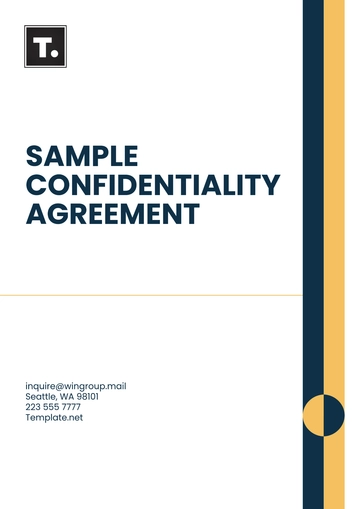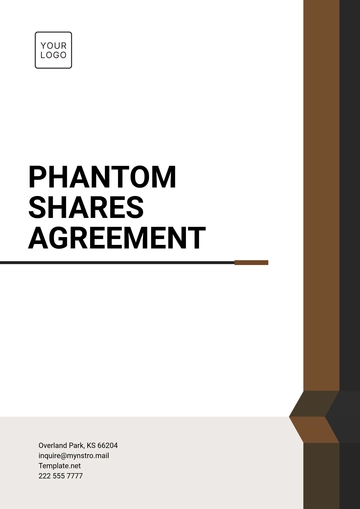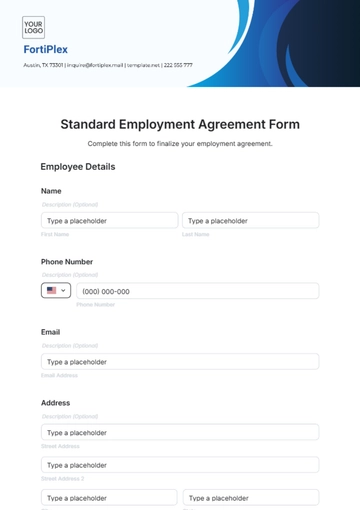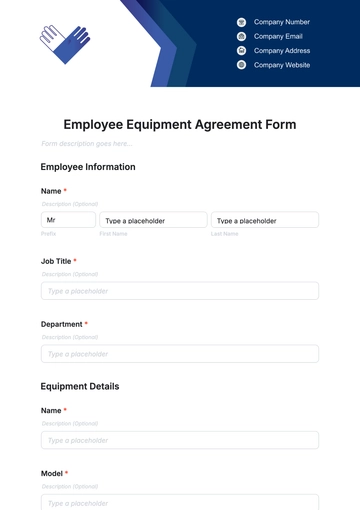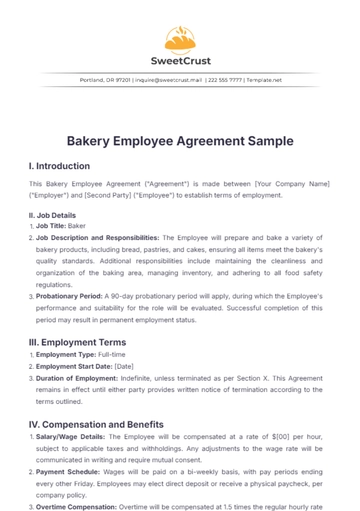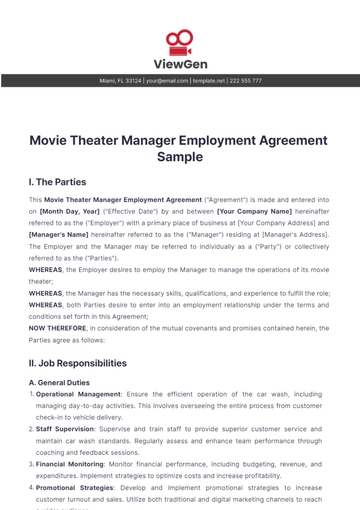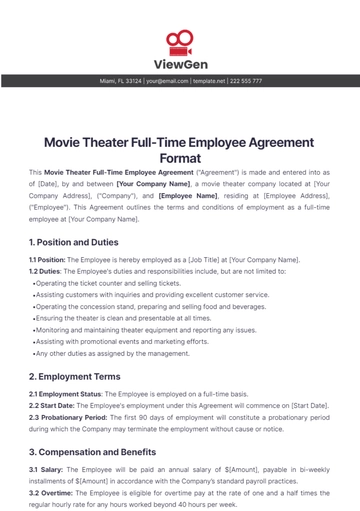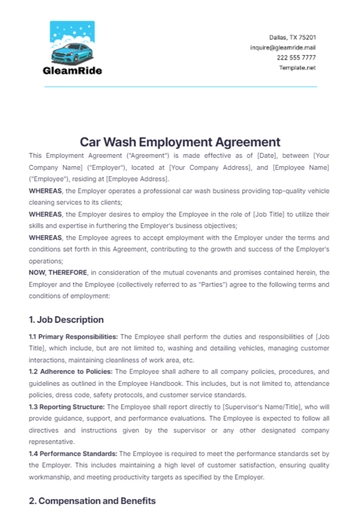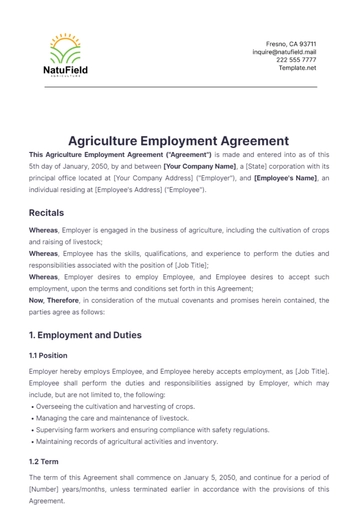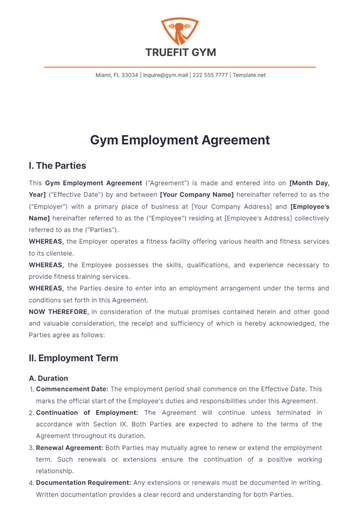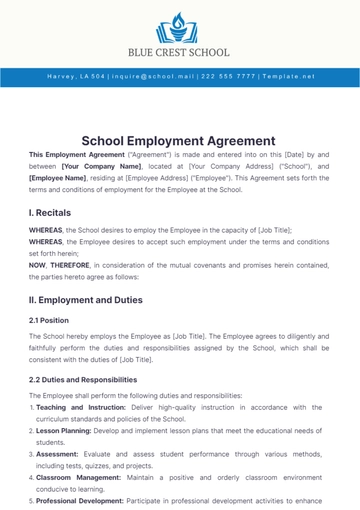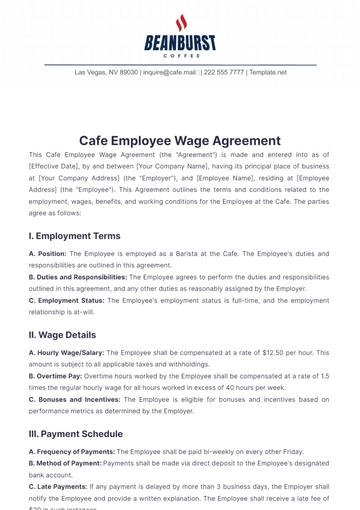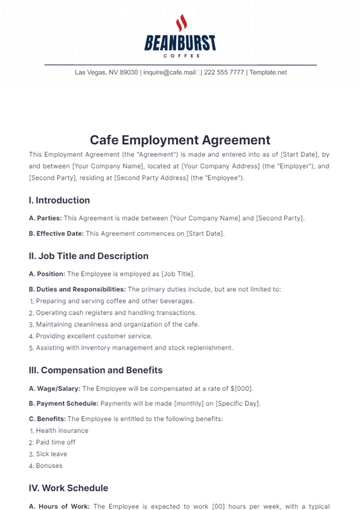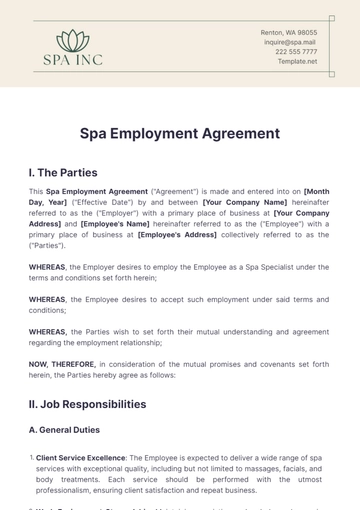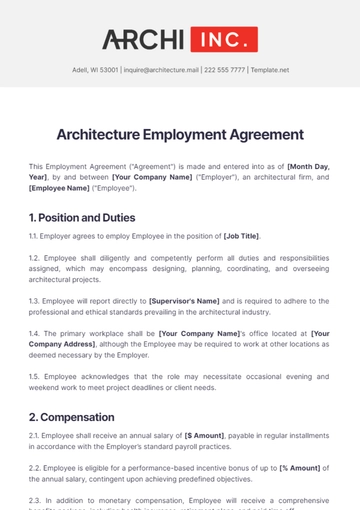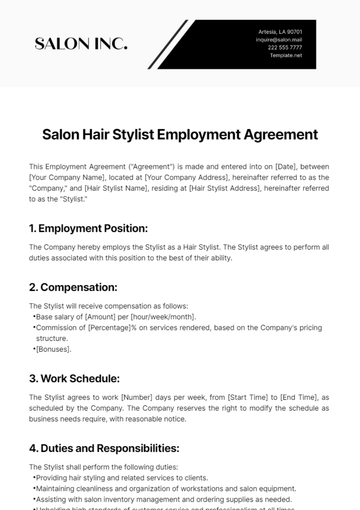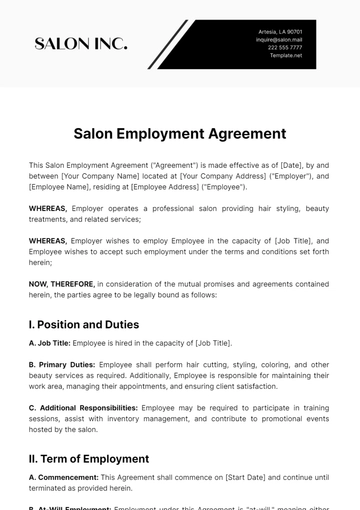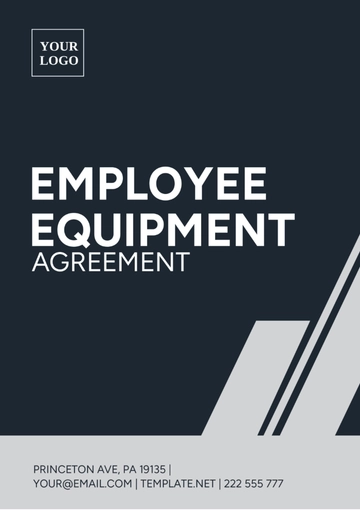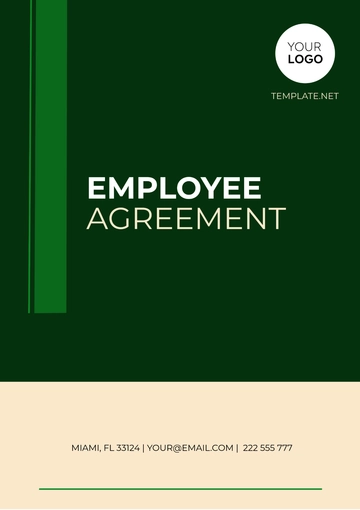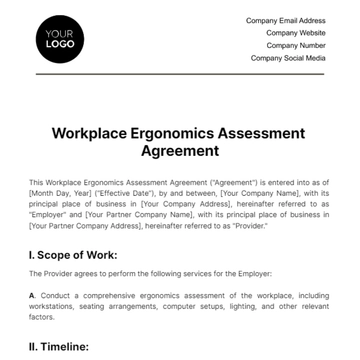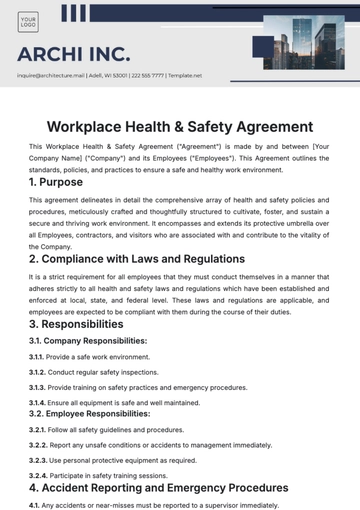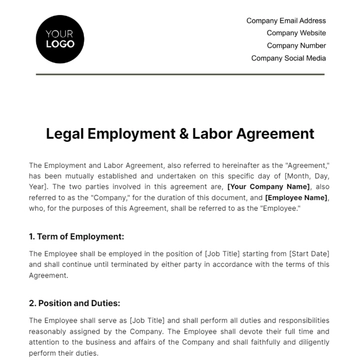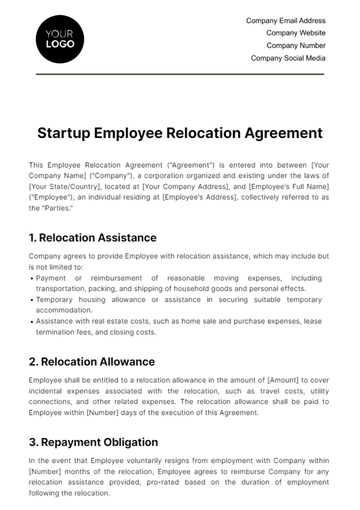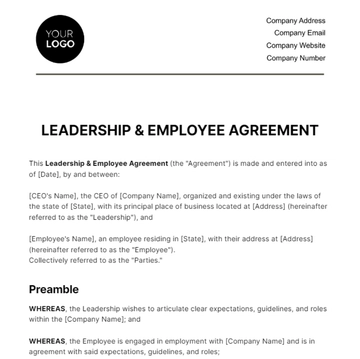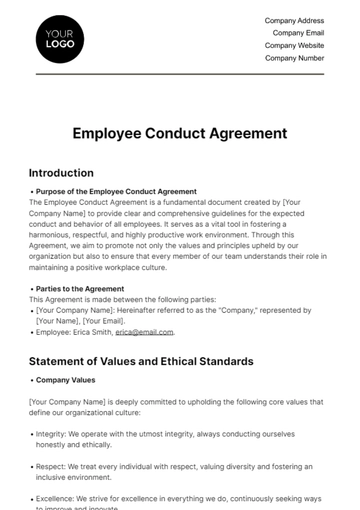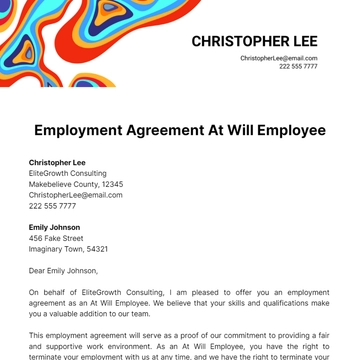Free Spa Employment Agreement
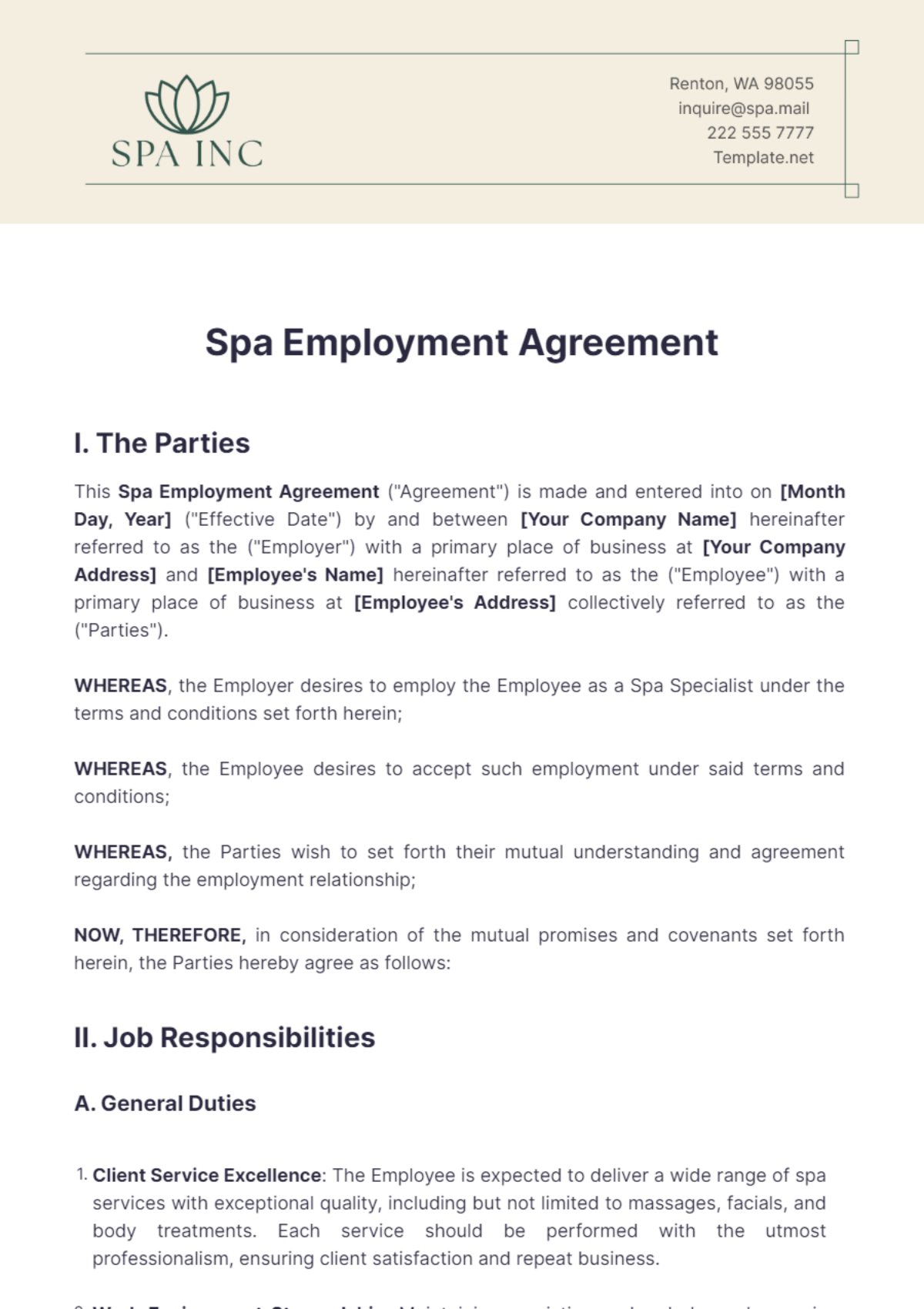
I. The Parties
This Spa Employment Agreement ("Agreement") is made and entered into on [Month Day, Year] ("Effective Date") by and between [Your Company Name] hereinafter referred to as the ("Employer") with a primary place of business at [Your Company Address] and [Employee's Name] hereinafter referred to as the ("Employee") with a primary place of business at [Employee's Address] collectively referred to as the ("Parties").
WHEREAS, the Employer desires to employ the Employee as a Spa Specialist under the terms and conditions set forth herein;
WHEREAS, the Employee desires to accept such employment under said terms and conditions;
WHEREAS, the Parties wish to set forth their mutual understanding and agreement regarding the employment relationship;
NOW, THEREFORE, in consideration of the mutual promises and covenants set forth herein, the Parties hereby agree as follows:
II. Job Responsibilities
A. General Duties
Client Service Excellence: The Employee is expected to deliver a wide range of spa services with exceptional quality, including but not limited to massages, facials, and body treatments. Each service should be performed with the utmost professionalism, ensuring client satisfaction and repeat business.
Work Environment Stewardship: Maintaining a pristine and orderly work area is paramount. The Employee must adhere to stringent health and safety standards to ensure a safe and welcoming environment for both clients and staff.
Product and Service Advocacy: The Employee will actively engage in the promotion of spa products and services, employing persuasive communication skills to enhance sales and client engagement.
Client Record Management: Diligent documentation of services rendered, along with any client preferences or special conditions, is required to provide personalized care and maintain service quality.
Professional Development: Participation in ongoing educational programs and team meetings is mandatory, fostering a culture of continuous improvement and expertise in spa services.
B. Specific Duties
Treatment Proficiency: The Employee will perform specialized treatments as directed by the Employer, ensuring each procedure meets the high standards of the spa industry and adheres to the Employer’s established protocols.
Consultation Expertise: Providing individualized consultations, the Employee will assess client needs and recommend treatments that align with their wellness goals, enhancing the overall spa experience.
Sanitation and Safety: The Employee is responsible for the rigorous sanitation of all spa equipment and tools, upholding the highest standards of cleanliness to ensure client safety and trust.
Inventory Oversight: Proactive reporting of inventory levels is essential. The Employee will monitor supplies, alerting the Employer to any items that require replenishment to maintain seamless spa operations.
C. Client Relations and Retention
Personalized Client Interaction: The Employee shall foster strong relationships with clients, tailoring interactions to meet individual preferences and ensuring a memorable spa experience that encourages loyalty.
Feedback Integration: Actively seeking and incorporating client feedback, the Employee will contribute to the spa’s service enhancement and address any areas of concern promptly.
Conflict Resolution: The Employee will employ effective problem-solving skills to resolve any client issues, maintaining the spa’s reputation for excellent customer service.
Loyalty Program Promotion: The Employee will promote the spa’s loyalty program, explaining benefits and incentives to clients to foster long-term engagement and repeat visits.
Community Engagement: Participation in community events and activities is encouraged to build the spa’s local presence and attract a broader client base.
III. Compensation
A. Salary
Base Salary: The Employee shall receive a monthly base salary of [$3800], payable in bi-weekly installments. This ensures a consistent and reliable income to support the Employee’s financial needs.
Performance Bonuses: Eligibility for additional performance-based bonuses will be at the discretion of the Employer, providing motivation for the Employee to strive for excellence in their role.
Additional Income: Opportunities to earn extra income through client tips and commissions on product sales are available, offering the Employee avenues to increase their earnings.
Tax Obligations: All salary payments are subject to applicable taxes and withholdings as required by law, ensuring compliance with fiscal responsibilities.
Compensation Review: The Employee’s salary and overall compensation package will be reviewed periodically to reflect performance, industry standards, and cost of living adjustments.
B. Overtime
Overtime Pay: Compensation for hours worked beyond the standard [40]-hour workweek will be at a rate of [1.5] times the regular pay, rewarding the Employee for their additional time and dedication.
Overtime Approval: Overtime work must be pre-approved by the Employer in writing to ensure proper management and acknowledgment of the Employee’s extra efforts.
Overtime Remuneration: Any overtime compensation earned will be included in the Employee’s next regular paycheck, ensuring timely payment for the additional work performed.
C. Benefits and Allowances
Healthcare Benefits: The Employee will be provided with a comprehensive healthcare plan, supporting their well-being and enabling them to perform their duties effectively.
Retirement Savings: A retirement savings plan will be made available to the Employee, aiding in long-term financial planning and security.
Professional Growth: The Employer will offer allowances for professional development, covering costs for training and certifications that enhance the Employee’s skills and career prospects.
Paid Time Off: The Employee will be entitled to paid time off, including vacation, sick leave, and personal days, recognizing the importance of rest and work-life balance.
Work Equipment Provision: Necessary work-related equipment and tools will be provided by the Employer, ensuring the Employee has everything needed to perform their job to the best of their ability.
IV. Benefits
A. Health Insurance
Commencement of Coverage: Starting [90] days after the Effective Date, the Employee will be eligible to participate in the Employer’s group health insurance plan, ensuring access to essential healthcare services.
Employer Contribution: The Employer will contribute [20]% towards the monthly premium of the Employee’s health insurance, demonstrating a shared commitment to the Employee’s health and well-being.
Dependent Coverage Option: The Employee has the option to extend their health insurance coverage to include dependents, providing flexibility and support for the Employee’s family at their own expense.
Plan Selection: The Employee will have the opportunity to select from various health insurance plans offered, allowing them to choose the coverage that best fits their needs and those of their dependents.
Continual Review: The terms of health insurance benefits will be reviewed annually, ensuring that the coverage remains competitive and responsive to the changing healthcare landscape.
B. Paid Time Off
Vacation Accrual: The Employee is entitled to [15] days of paid vacation each year, accruing at a rate of [1.25] days per month, providing ample opportunity for rest and rejuvenation.
Sick Leave Provision: In addition to vacation time, the Employee will receive [7] paid sick days annually, available after the initial [30] days of employment, offering protection during times of illness.
Carryover Flexibility: While generally unused paid time off does not carry over, the Employer may specify conditions under which carryover is permitted, providing additional flexibility for the Employee.
Paid Time Off Management: The Employee will be able to track and manage their paid time off through a company-provided system, ensuring transparency and ease of use.
Unplanned Absences: In the event of unforeseen circumstances requiring the Employee’s absence, the Employer will work with the Employee to accommodate their needs within the framework of the company’s policies.
C. Additional Benefits
Retirement Savings Plan: The Employer offers a retirement savings plan, encouraging the Employee to invest in their long-term financial stability with matching contributions to enhance the benefit.
Professional Development: The Employee will have access to professional development opportunities, including workshops and seminars, which are integral to career advancement and skill enhancement.
Wellness Programs: The Employer will provide wellness programs aimed at promoting a healthy work-life balance, including stress management resources and fitness incentives.
Employee Assistance Programs: Confidential counseling and support services will be available to the Employee, addressing a range of personal and professional challenges.
Recognition and Rewards: The Employer will implement a recognition program to reward the Employee for outstanding performance and contributions to the spa’s success.
V. Working Hours
A. Regular Hours
Standard Work Schedule: The Employee’s workweek will consist of [40] hours, typically structured from [9:00 AM] to [5:00 PM], spanning [Monday] through [Friday]. This schedule provides a consistent framework for both personal and professional time management.
Lunch Break: Each workday, the Employee is entitled to a [30]-minute unpaid lunch break. This break is a designated period for rest and rejuvenation during the workday, contributing to overall well-being and productivity.
Paid Rest Periods: To maintain peak performance and focus, the Employee will receive two [15]-minute paid breaks during their shift—one in the morning and another in the afternoon. These breaks are essential for mental and physical refreshment.
B. Shift Adjustments
Flexible Scheduling: The Employer may adjust the Employee’s work schedule to align with evolving business needs. Any changes will be communicated with a minimum of one week’s notice, respecting the Employee’s time and allowing for adequate adjustment.
Emergency Protocols: In the event of an emergency, the Employee may be called upon to work additional hours or shifts. While such instances are rare, they are crucial for the spa’s operational continuity and client service.
Communication of Availability: The Employee is responsible for promptly informing the Employer of any scheduling conflicts or changes in availability. Open communication is vital to ensure smooth operations and fair scheduling practices.
C. Time Tracking and Overtime
Accurate Timekeeping: The Employee will record their work hours using the Employer’s time-tracking system. Accurate timekeeping is essential for payroll accuracy and compliance with labor regulations.
Overtime Considerations: Should the need for overtime arise, the Employee will be compensated according to the terms outlined in Section III. Overtime work requires prior approval and will be reflected in the subsequent paycheck.
Work-Life Balance: The Employer is committed to promoting a healthy work-life balance. As such, consistent overtime work will be monitored, and efforts will be made to redistribute workloads when possible.
D. Schedule Flexibility and Personal Time
Personal Appointments: The Employer acknowledges the necessity of personal appointments and will endeavor to accommodate requests for time off outside of the Employee’s accrued paid time off, within reason.
Remote Work Options: Depending on the nature of the Employee’s role and responsibilities, there may be opportunities for remote work, offering flexibility and convenience.
Advanced Notice for Major Events: For significant personal events requiring extended time off, the Employee is encouraged to provide as much notice as possible, allowing the Employer to plan accordingly.
VI. Professional Conduct
A. Code of Conduct
Upholding Professional Standards: The Employee is expected to consistently demonstrate professionalism and respect in all interactions with clients and colleagues, thereby maintaining the integrity and reputation of the spa.
Personal Presentation: Adherence to personal hygiene and the Employer’s dress code is mandatory for the Employee, reflecting the spa’s commitment to excellence and attention to detail in every aspect of its operations.
Behavioral Expectations: The Employee must conduct themselves in a manner that upholds the spa’s values and avoids any actions that could harm the Employer’s reputation or the smooth operation of the business.
Positive Workplace Environment: The Employee shall contribute to a positive and supportive workplace environment, fostering teamwork and collaboration among staff.
Continuous Improvement: The Employee is encouraged to provide constructive feedback and suggestions for improving the spa’s services and workplace culture, demonstrating a proactive approach to personal and organizational growth.
B. Confidentiality
Client Privacy: The Employee shall treat all client information and treatment records with the utmost confidentiality, in line with privacy laws and the high standards expected in the spa industry.
Protection of Business Information: The Employee is entrusted with the responsibility of safeguarding the Employer’s proprietary information and trade secrets, ensuring that such details are not disclosed to any unauthorized individuals.
Disciplinary Measures: Non-compliance with confidentiality obligations is taken seriously and may lead to disciplinary action, including potential termination of employment, to protect the interests of the spa and its clients.
Training and Awareness: The Employee will receive regular training on confidentiality and data protection, ensuring they are well-informed about their responsibilities and the importance of these protocols.
Reporting Breaches: In the event of a suspected breach of confidentiality, the Employee is required to report the incident promptly to management for immediate investigation and resolution.
C. Compliance and Ethics
Legal Adherence: The Employee must comply with all applicable laws and regulations governing the spa industry, demonstrating a commitment to lawful and ethical conduct.
Conflict of Interest: The Employee shall avoid any situations that could lead to a conflict of interest or the appearance of impropriety, prioritizing the spa’s interests in their professional activities.
Gifts and Gratuities: The Employee shall adhere to the Employer’s policies regarding the acceptance of gifts and gratuities from clients or vendors, ensuring transparency and fairness in all transactions.
Respectful Communication: The Employee is expected to engage in respectful and courteous communication with all individuals, whether in person, over the phone, or through digital channels.
Social Media Conduct: The Employee shall exercise discretion and good judgment when posting on social media platforms, ensuring that their online presence aligns with the spa’s values and professional standards.
VII. Termination of Employment
A. Voluntary Termination
Notice of Departure: The Employee has the right to voluntarily terminate their employment agreement, provided they give a minimum of [2] weeks’ written notice to the Employer, allowing for a smooth transition and handover of responsibilities.
Return of Property: Upon departure, it is the Employee’s responsibility to return all items belonging to the Employer, such as uniforms, keys, and any documents containing client information, ensuring that all property is accounted for and secured.
Final Compensation: The Employee will be compensated for all hours worked until the termination date, including payment for any accrued but unused paid time off, reflecting the Employer’s commitment to fair labor practices.
B. Involuntary Termination
Termination for Cause: The Employer reserves the right to terminate the Employee’s employment for justifiable reasons, which may include misconduct, substandard performance, or breaches of company policies, ensuring the integrity of the spa’s operations.
Final Salary Payment: In cases of termination for cause, the Employee will receive their base salary earned up to the termination date. However, they will not be eligible for any additional bonuses or benefits that have not been realized at the time of termination.
Notification Process: The Employer is obligated to provide the Employee with a written notice of termination, detailing the specific reasons for the decision, promoting transparency and clear communication.
C. Resignation Procedures
Exit Interview: The Employee is encouraged to participate in an exit interview to provide feedback on their employment experience, which can be valuable information for the Employer to improve workplace practices and employee satisfaction.
Assistance with Transition: The Employer will offer support in the transition process, such as providing references or assistance in finding new employment opportunities, as a gesture of goodwill and appreciation for the Employee’s service.
Post-Termination Obligations: The Employee is reminded of any post-termination obligations, such as non-disclosure and non-compete clauses, which remain in effect even after the employment relationship has ended.
D. Reduction in Force
Economic Layoffs: In the event of a reduction in force due to economic reasons, the Employer will follow fair and equitable procedures for selecting employees for layoff, considering factors such as tenure, performance, and the needs of the spa.
Severance Package: Eligible Employees affected by layoffs may receive a severance package, which will be determined based on their length of service and position, as a form of support during their transition.
Rehire Preference: Should the spa’s economic situation improve, Employees who were laid off will be given preference for rehire, acknowledging their previous contributions and facilitating their potential return to the team.
VIII. Dispute Resolution
A. Mediation
Initial Conflict Resolution: Should a dispute arise from this Agreement, both Parties commit to engaging in mediation as the first step towards resolution, fostering a cooperative approach to conflict management.
Neutral Mediator Engagement: A neutral third party, agreed upon by both the Employer and the Employee, will conduct the mediation, ensuring an unbiased process aimed at achieving a fair outcome.
Cost Responsibility: Each Party will be responsible for covering their own costs incurred during the mediation process, promoting a sense of ownership and investment in the resolution process.
Mediation Process: The mediation will follow a structured process that includes sessions facilitated by the mediator, with the goal of reaching a mutually acceptable agreement.
Confidentiality in Mediation: All discussions and materials related to the mediation process will be kept confidential, protecting the interests and privacy of both Parties.
B. Arbitration
Secondary Resolution Method: If mediation does not result in a resolution, the Parties agree to move forward with binding arbitration, administered by a reputable arbitration service, as a definitive means of settling the dispute.
Finality of Decision: The arbitrator’s decision will be considered final and binding on both Parties, eliminating the option for an appeal and providing closure to the dispute.
Shared Arbitration Costs: The financial burden of the arbitration process will be shared equally between the Employer and the Employee, unless the arbitrator decides otherwise, ensuring a balanced approach to cost-sharing.
Selection of Arbitrator: The arbitrator will be selected through a fair and transparent process, with both Parties having input into the choice, to ensure confidence in the impartiality of the proceedings.
Arbitration Proceedings: The arbitration will be conducted in a manner that respects the rights of both Parties, with opportunities for each to present their case, evidence, and arguments.
C. Legal Proceedings
Last Resort: As a final recourse, if arbitration is not applicable or if its outcome is not enforceable, the Parties may seek resolution through legal proceedings, adhering to the jurisdictional laws where the spa operates.
Jurisdiction and Venue: The Parties agree that any legal proceedings will be conducted in the jurisdiction where the Employer’s primary place of business is located, providing a clear and agreed-upon venue for legal actions.
Legal Fees: In the event of legal proceedings, each Party will be responsible for their own legal fees, unless the court orders otherwise, as part of the judgment.
D. Continuation of Services
Ongoing Operations: During the dispute resolution process, the Employee agrees to continue providing services to the best of their ability, ensuring that spa operations are not unduly affected.
Non-Retaliation: The Employer commits to a policy of non-retaliation against the Employee for initiating a dispute resolution process, upholding a fair and respectful workplace environment.
Settlement Encouragement: Both Parties are encouraged to seek a settlement at any stage of the dispute resolution process, with the aim of preserving the working relationship and minimizing disruption to the spa’s operations.
IX. Governing Law
A. Jurisdiction
Legal Framework: This Agreement is governed by the laws of [State Name], ensuring that the terms and conditions are interpreted and enforced in accordance with the state’s legal standards.
Court Jurisdiction: In the event of legal disputes, both Parties agree to submit exclusively to the jurisdiction of the courts located within [State Name], providing a predetermined venue for legal proceedings.
Applicable Law: All aspects of the employment relationship, including compensation, work conditions, and termination, will be subject to the laws and regulations of [State Name], aligning the Agreement with the state’s legal practices.
B. Legal Interpretation
Agreement Interpretation: Should any ambiguities or questions of intent or interpretation arise, the Agreement will be construed under the laws of [State Name], without regard to any conflict of law provisions.
Legal Precedents: The interpretation of this Agreement will be informed by the established legal precedents and case law within [State Name], ensuring consistency and predictability in its application.
Legal Counsel: Both Parties have the right to seek independent legal counsel to aid in the interpretation and enforcement of this Agreement, ensuring that their rights and obligations are clearly understood and upheld.
C. Compliance
Regulatory Adherence: The Employer and the Employee will adhere to all applicable federal, state, and local laws and regulations, affirming their commitment to lawful and ethical business practices.
Amendments and Modifications: Any amendments or modifications to this Agreement will be made in writing and will be subject to the laws of [State Name], maintaining the legal integrity of the Agreement.
Enforceability: If any provision of this Agreement is found to be unenforceable, the remaining provisions will continue to be in full force and effect, ensuring the Agreement’s overall validity.
D. Conflict Resolution
Legal Dispute Management: In managing disputes, the Parties will first seek resolution through the steps outlined in Section VIII, with the understanding that unresolved issues may ultimately be decided by the courts of [State Name].
Legal Representation: Each Party has the right to legal representation in any court proceedings, ensuring that their interests are adequately represented and defended.
Court Proceedings: Court proceedings will be conducted in a manner that respects the due process rights of both Parties, with each having the opportunity to present evidence and arguments in support of their positions.
X. Entire Agreement
A. Superseding Clause
Comprehensive Understanding: This Agreement embodies the full and complete understanding between the Parties regarding the employment relationship and supersedes all prior discussions, agreements, and understandings, both written and oral.
Prevailing Document: In the event of any discrepancies between this Agreement and any previous agreements, the terms of this current Agreement will prevail, ensuring clarity and consistency in the terms of employment.
Final Authority: This document serves as the final authority on the terms of the Employee’s employment with the Employer, providing a single point of reference for the conditions of their working relationship.
B. Amendments and Modifications
Written Changes Required: Any changes, amendments, or modifications to this Agreement must be made in writing, ensuring that all alterations are deliberate and mutually agreed upon.
Mutual Agreement: Both Parties must provide their explicit written consent to any amendments, safeguarding against unilateral changes and maintaining the integrity of the original agreement.
Signatory Validation: Changes to this Agreement will only be considered valid and enforceable when signed by both Parties, providing a clear record of any adjustments made to the terms of employment.
C. Acknowledgment of Terms
Informed Consent: By signing this Agreement, both Parties acknowledge that they have read, understood, and agreed to the terms herein, affirming their informed consent to the conditions of employment.
Opportunity for Review: Prior to signing, both Parties have had the opportunity to review the Agreement thoroughly and seek independent legal advice, ensuring that they enter into this Agreement with full knowledge and understanding.
Voluntary Commitment: The acceptance of this Agreement by both Parties is made voluntarily and without any undue pressure or influence, reflecting a mutual commitment to a fair and transparent employment relationship.
D. Binding Nature
Legally Binding Contract: This Agreement constitutes a legally binding contract between the Parties, enforceable under the laws of the jurisdiction as outlined in Section IX.
Successors and Assigns: The terms of this Agreement will be binding upon and inure to the benefit of the Parties and their respective successors and assigns, ensuring continuity of the Agreement’s provisions.
Duration of Terms: The terms and conditions of this Agreement will remain in effect for the duration of the Employee’s employment with the Employer, unless lawfully terminated or amended as provided herein.
XI. SIGNATURES
By signing below, the Parties acknowledge that they have read and understood the terms of this Agreement and agree to be bound thereby.
Employer

[Authorized Representative Name]
[Your Company Name]a
Date: [Month Day, Year]
Employee

[Employee's Name]
Date: [Month Day, Year]
- 100% Customizable, free editor
- Access 1 Million+ Templates, photo’s & graphics
- Download or share as a template
- Click and replace photos, graphics, text, backgrounds
- Resize, crop, AI write & more
- Access advanced editor
Craft a comprehensive employment agreement using our customizable template the Spa Employment Agreement Template from Template.net! Tailored specifically for spa operations, this resource offers editable sections to address employment terms and responsibilities. Utilize the AI Editor Tool for seamless customization and ensure legal compliance throughout the process. Access right away!
You may also like
- Lease Agreement
- Non Compete Agreement
- Rental Agreement
- Prenuptial Agreement
- Non Disclosure Agreement
- Operating Agreement
- Hold Harmless Agreement
- LLC Operating Agreement
- Arbitration Agreement
- Purchase Agreement
- Residential Lease Agreement
- Executive Agreement
- Confidentiality Agreement
- Contractor Agreement
- Partnership Agreement
- Postnuptial Agreement
- Collective Bargaining Agreement
- Loan Agreement
- Roommate Agreement
- Commercial Lease Agreement
- Separation Agreement
- Cohabitation Agreement
- Room Rental Agreement
- Child Custody Agreement
- Employee Agreement
- License Agreements
- Settlement Agreement
- Joint Venture Agreement
- Indemnity Agreement
- Subordination Agreement
- Sales Agreement
- Agreements Between Two Parties
- Business Agreement
- Real Estate Agreement
- HR Agreement
- Service Agreement
- Property Agreement
- Agreement Letter
- Restaurant Agreement
- Construction Agreement
- Finance Agreement
- Marketing Agreement
- Payment Agreement
- Investment Agreement
- Management Agreement
- Nonprofit Agreement
- Software Agreement
- Startup Agreement
- Agency Agreement
- Copyright Agreement
- Collaboration Agreement
- Reseller Agreement
- Car Rental Agreement
- Cleaning Services Agreement
- Consultant Agreement
- Deed Agreement
- Car Agreement
- Equipment Agreement
- Shares Agreement
- Data Sharing Agreement
- Advertising Agreement
- School Agreement
- Franchise Agreement
- Event Agreement
- Travel Agency Agreement
- Vehicle Agreement
- Board Resolution Agreement
- Land Agreement
- Binding Agreement
- Tenancy Agreement
- Exclusive Agreement
- Development Agreement
- Assignment Agreement
- Design Agreement
- Equity Agreement
- Mortgage Agreement
- Purchase and Sale Agreement
- Shareholder Agreement
- Vendor Agreement
- Royalty Agreement
- Vehicle Lease Agreement
- Hotel Agreement
- Tenant Agreement
- Artist Agreement
- Commission Agreement
- Consignment Agreement
- Debt Agreement
- Recruitment Agreement
- Training Agreement
- Transfer Agreement
- Apprenticeship Agreement
- IT and Software Agreement
- Referral Agreement
- Resolution Agreement
- Waiver Agreement
- Consent Agreement
- Partner Agreement
- Social Media Agreement
- Customer Agreement
- Credit Agreement
- Supply Agreement
- Agent Agreement
- Brand Agreement
- Law Firm Agreement
- Maintenance Agreement
- Mutual Agreement
- Retail Agreement
- Deposit Agreement
- Land Purchase Agreement
- Nursing Home Agreement
- Supplier Agreement
- Buy Sell Agreement
- Child Support Agreement
- Landlord Agreement
- Payment Plan Agreement
- Release Agreement
- Research Agreement
- Sponsorship Agreement
- Buyout Agreement
- Equipment Rental Agreement
- Farm Agreement
- Manufacturing Agreement
- Strategic Agreement
- Termination of Lease Agreement
- Compliance Agreement
- Family Agreement
- Interior Design Agreement
- Ownership Agreement
- Residential Lease Agreement
- Retainer Agreement
- Trade Agreement
- University Agreement
- Broker Agreement
- Dissolution Agreement
- Funding Agreement
- Hosting Agreement
- Investor Agreement
- Memorandum of Agreement
- Advisory Agreement
- Affiliate Agreement
- Freelancer Agreement
- Grant Agreement
- Master Service Agreement
- Parking Agreement
- Subscription Agreement
- Trust Agreement
- Cancellation Agreement
- Horse Agreement
- Influencer Agreement
- Membership Agreement
- Vacation Rental Agreement
- Wholesale Agreement
- Author Agreement
- Distributor Agreement
- Exchange Agreement
- Food Agreement
- Guarantee Agreement
- Installment Agreement
- Internship Agreement
- Music Agreement
- Severance Agreement
- Software Development Agreement
- Storage Agreement
- Facility Agreement
- Intercompany Agreement
- Lending Agreement
- Lodger Agreement
- Outsourcing Services Agreement
- Usage Agreement
- Assurance Agreement
- Photography Agreement
- Profit Sharing Agreement
- Relationship Agreement
- Rent To Own Agreement
- Repayment Agreement
- Volunteer Agreement
- Co Parenting Agreement
- HVAC Agreement
- Lawn Care Agreement
- SAAS Agreement
- Work from Home Agreement
- Coaching Agreement
- Protection Agreement
- Security Agreement
- Repair Agreement
- Agreements License
